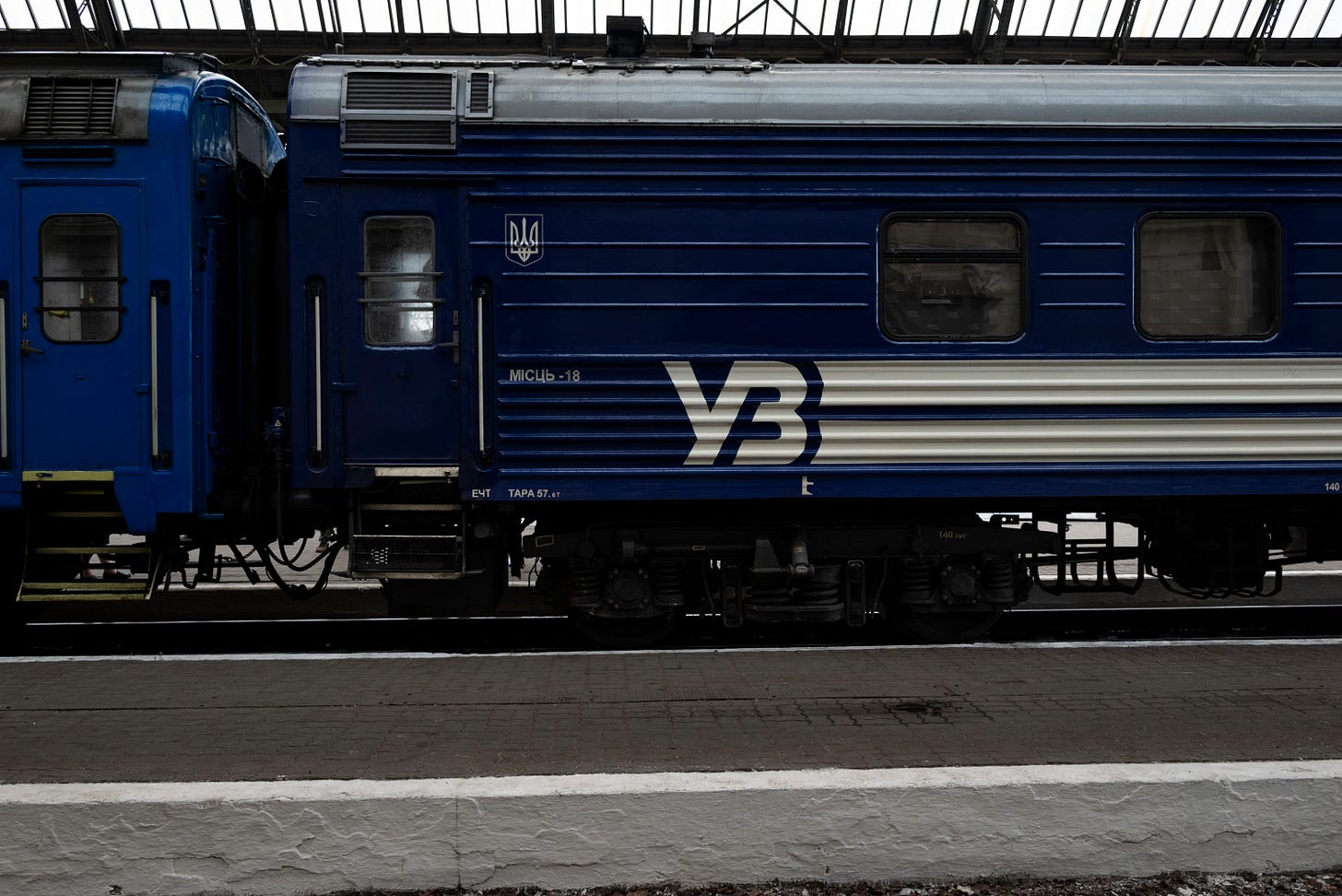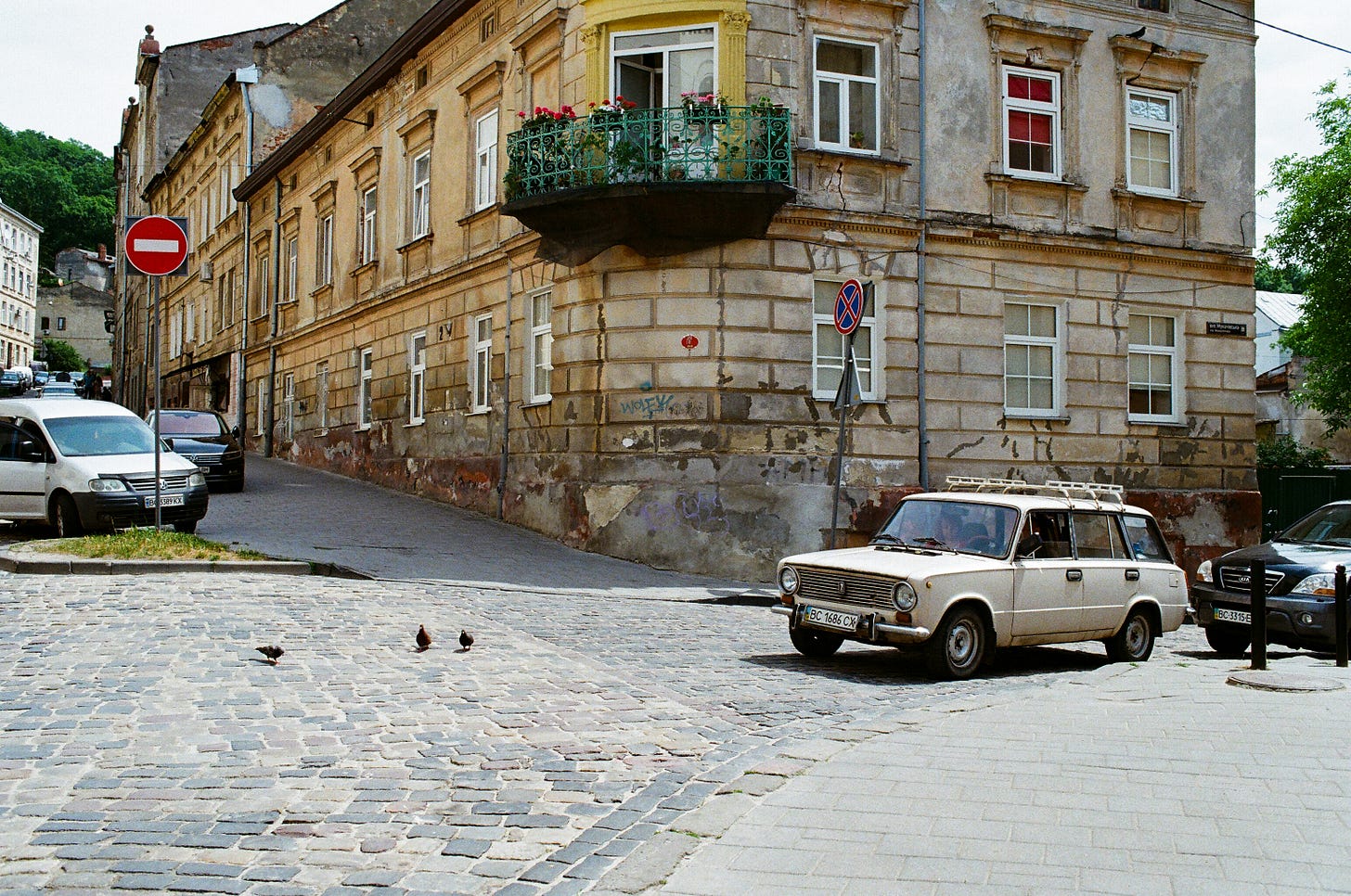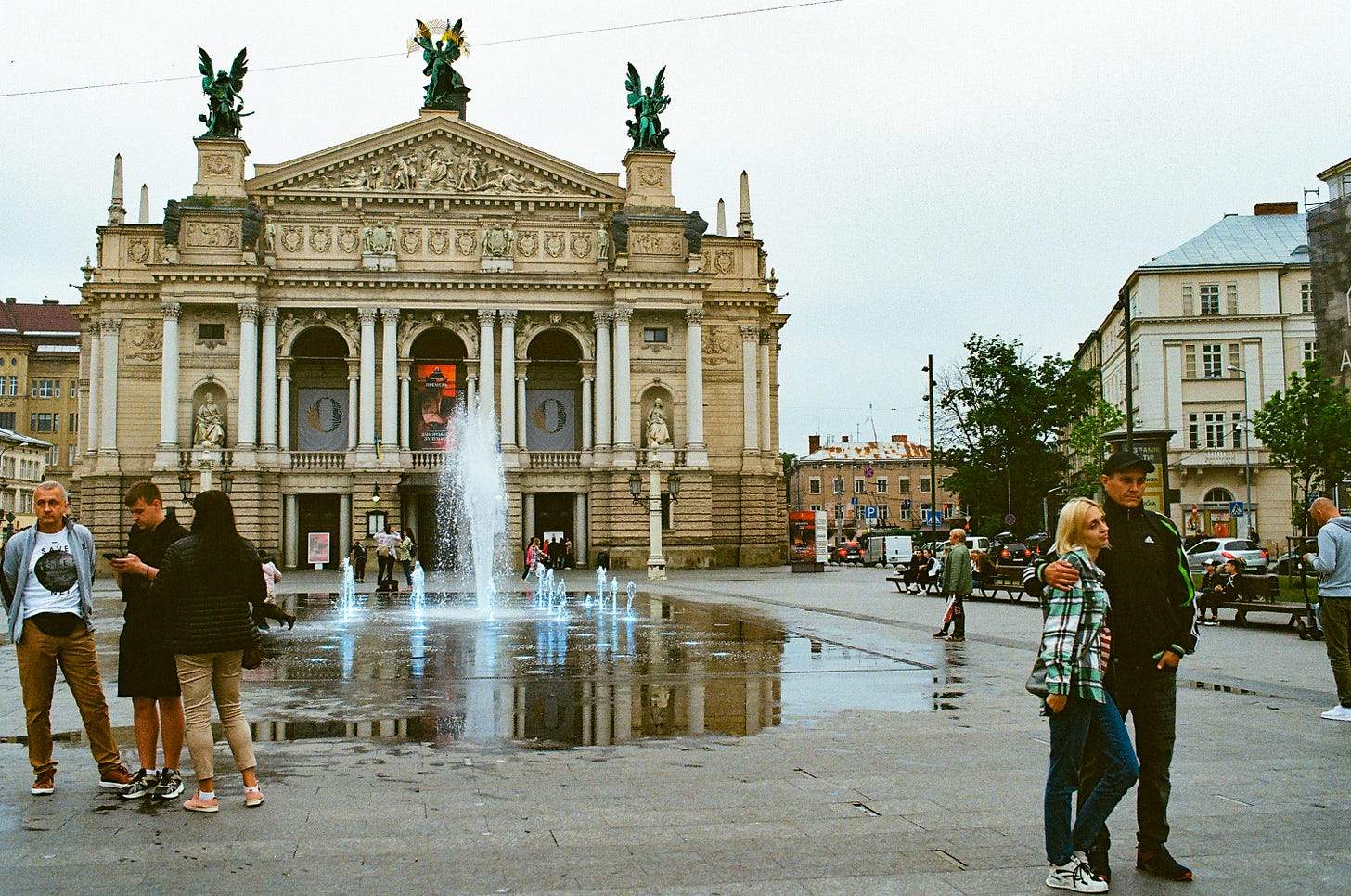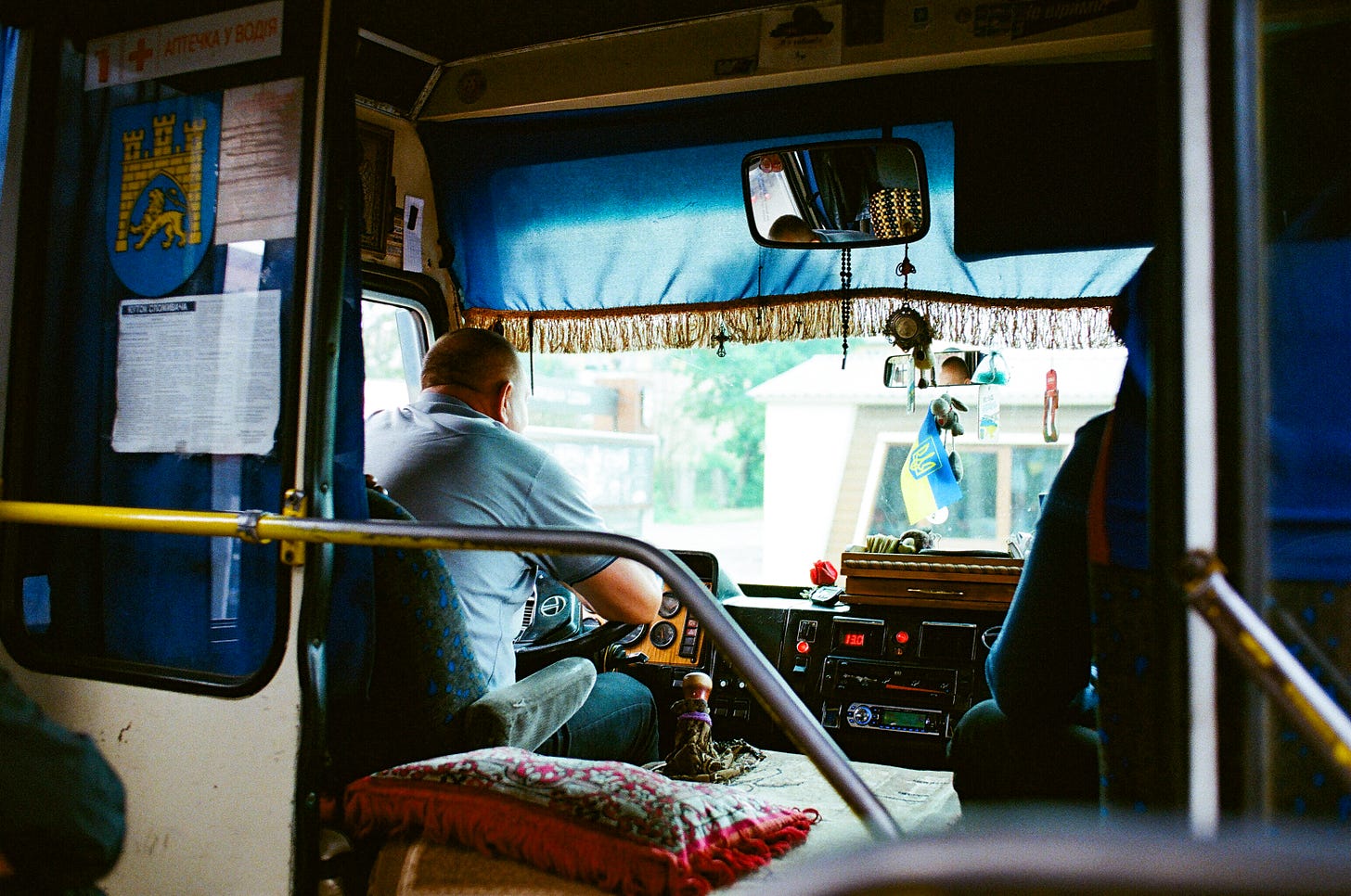It was midafternoon on an early Friday off of work when realized that I didn’t have to work at all the next week because it’s the end of the school year. But it wasn’t just the end of the school year again, it’s the end of my job contract, and I’m unemployed again. What else does someone do when they're newly unemployed and waiting on the last paycheck? You buy tickets to go to somewhere, and I booked my ticket to go to Ukraine. I had booked train tickets to Lviv very last minute on a shoestring budget and didn’t mention anything to my mom until well after I had committed to the ordeal. The train tickets one way were $22, it was $19 for 4 nights at a hostel in Lviv and $15 for an insurance package that covered everything from COVID to injuries sustained from missile strikes. Usually when I travel overland I go about my travels in one of two ways, it is meticulously planned with an hour by hour itinerary, or it is so haphazardly planned to the point where I am basically just drifting between places. Given the current situation in Ukraine I decided a middle road would be my best plan to at least cushion any sort of potential problems. On the morning of the 6th of June I got onto a local IC train to Przemyśl, the last city with a rail hub in Poland before arriving at the border and made my way through border patrol and onto the train platform handling cross border trains. The Ukrainian train car was far taller than the Polish trains and painted in a striking blue color. The tryzub, Ukraine’s national trident symbol was painted on the rear corner of every car. The side of the train cars had a corrugated pattern and the engine was dragged right out from another era. The train car stewardess was shocked to see an American passport, which I guess shouldn’t have surprised me at all. I threw my duffle bag and hardshell camera case down in the compartment, ready to cross the border.
Like all great stories and adventures that begin in the area of the former Soviet Union, all the magic seems to happen in the sleeper car on a train. It was early afternoon right after lunchtime and I was in the sleeper car with a German, Polish and Ukrainian man, which sounds like the set up to a bad bar room joke. All trains crossing the border into Poland have only been operating sleeper cars for the past couple of weeks or months, who knows. But we talked for about 4 and a half hours over tea and melting chocolate covered crackers. We weren’t allowed to open the windows incase there was a bomb blast so we sweated into the bottom two bunk beds as the train lumbered on. The German man, also named Alexander but who went by Sasha, told me that he had been working with volunteer groups in Ukraine since the war had broken out. He was going to Lviv to work with a medical volunteer group at the train station. We disembarked at Lviv Vokzal after an hour or two of gliding through the western Ukrainian countryside. Sasha and I exchanged info and decided to meet for a beer later that day. The hostel was dingy, hot and uncomfortable. It reminded me of a cabin style barracks I stayed at one summer during a youth summer camp near Chelsea, Michigan. It was not the type of place where comfort or socialization was a resounding feature. I fled the hostel in the evening to meet with Sasha when we ran into two of his friends also working for the same group. Andrew from Birmingham, Michigan and Ivan from New York City. Already finding a Michigan boy after being in Ukraine for less than 12 hours had nearly blown my mind. I hadn't met anyone from Michigan in the past two years of living in Poland and it took barely any time to find one here. After a drink or two and being yelled at by the police for curfew, they asked me to come to the train station and photograph them in the morning.
Lviv has unique weather compared to other parts of Eastern Europe, because of its geography it has this nasty almost Gulf Coast like weather in the summer, where it rains when it feels like it and the humidity rarely drops under 70%. Sometimes the water was palpable in the air, even as dark clouds rolled overhead. It was still humid but a bit cooler in the morning, as military men chain smoked cigarettes on the station platform in front of idle carriages. Andrew and Ivan showed me around the hulking Austrian era train station, redesigned with a socialist aesthetic after the war. After reading over the train schedule and preparing to unload an evacuation train coming from Zaporizhzhia, the air raid sirens started blasting across the air. There was absolutely no sense of urgency until one of the older volunteers decided that we should shelter in the bomb shelter.
After a short time in the shelter and another few hours helping and photographing at the train station many of us made our way back home for the evening after a late lunch of khachapuri and chinkali. Yet in all of the hot early summer heat and swelling humidity I still needed to buy a return ticket home. By all bizarre and interesting means I was invited to a cello concert that a friend was hosting in a small town south of Jarosław on Saturday afternoon. They guaranteed transport from Jarosław to the village if I was able to get myself there by 3pm. After a long visit to Lychakiv Cemetery I decided to by my train tickets back. At the time I was there the Khakova Dam exploded only a day or two before. This would be an issue more than I anticipated, as every train to Poland was sold out for days on end. After much stressing I heard about the Western Bus station, about 8km west of the city. From here I could buy a bus ticket to Shehnyi, a border town on the border with Poland with a pedestrian crossing across the border. With tickets secured, it looked like my Saturday morning would be spent walking across the border. Air raids would happen again later in the evening, finding myself sheltering near a cellar by the hostel.
But with intermittent air raid sirens and a stream of people constantly coming into the train station from all places of the countries, we were still able to somehow enjoy our days. I would spend mornings at the train station photographing volunteer operations, lunch with new-found friends afterwards and an afternoon photographing the gorgeous parks and and city streets in the afternoon. To a certain degree life felt normal, but as Valentyn, the operations manager of the MedPsyLviv group told me as I was interviewing him, “Some mornings you’re sitting in the kitchen with your coffee and you just want to say fuck it. There's so much weight on your shoulders all of the time.” The stress of existing in a war zone and carrying on with daily life is something that Ukrainians have adapted to very well, yet on occasion the stress is palpable among the people.
My final day there I was supposed to go to Drohobych, a town I had wanted to visit for years because of its literary and cultural history in Western Ukraine, but I couldn’t make it because I was invited to join the volunteer group to visit an animal shelter instead that rescued abandoned animals. The shelter was filled with dogs, cats, foxes, horses, birds of all types, goats and even a monkey of some sort. (My irrational fear of primates prevented me from figuring out what sort of monkey it was). After a long day of moving aid and photographing everything in between I settled in for dinner with Ivan and Andrew, Alexander the German and another American named Chris that had just arrived from Florida. A flight of 32 shots later in a secret cellar restaurant off the main square and another few hours of drinks at the American’s apartment, it was time to go back to the hostel. I woke up an hour before the bus was supposed to leave. I was barely functioning and barely made it onto the 40 year old marshrutka bus on for the long journey back to the Polish border and eventually Jarosław. After a ride through the country side to the border it was time to walk across. With rain clouds ahead and surrounded by rusted barbed wire fences, the Ukrainian border guards weren’t skeptical of me, but my luggage. A solid plastic luggage designed to carry camera equipment. My principal problem with this luggage is that its made by a company that primarily makes solid cases for firearms, so airport and border security usually mistake it for a firearms case before I open it and show them the true weapon is rather a set of 45 year old cameras. After a four hour wait outside in the rain I finally made it to Polish border security, who believed that my American passport was a fake. After much deliberation they finally allowed me into the country.
The rest of my afternoon was exhausting and enjoyable. With a killer hangover and wearing nothing but dirty clothes, I slept at the manor house in the countryside where the concert was to take place, with a view of the distant hills, lily flowers, and cows right outside the window.










Great story Alex it was like I was along with you for the journey. I have to represent the Michigan peeps in Polsce but correct I’m not a resident 🤪
Love the article! Keep up the good work :)